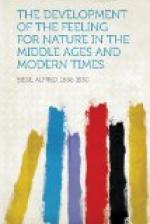Immortal youth!
Thou streamest forth from rocky caves;
No mortal saw
The cradle of thy might,
No ear has heard
Thy infant stammering in the gushing Spring.
How lovely art thou in thy silver locks!
How dreadful thundering from the echoing
crags!
At thy approach
The firwood quakes;
Thou easiest down, with root and branch,
the fir
Thou seizest on the rock,
And roll’st it scornful like a pebble
on.
Thee the sun clothes in dazzling beams
of glory,
And paints with colours of the heavenly
bow
The clouds that o’er thy dusky cataracts
climb.
Why hasten so to the cerulean sea?
Is not the neighbourhood of heaven good?
Not grand thy temple of encircling rocks?
Not fair the forest hanging o’er
thy bed?
Hasten not so to the cerulean sea;
Youth, thou art here,
Strong as a god,
Free as a god,
Though yonder beckon treacherous calms
below,
The wavering lustre of the silent sea,
Now softly silvered by the swimming moon,
Now rosy golden in the western beam;
Youth, what is silken rest,
And what the smiling of the friendly moon,
Or gold or purple of the evening sun,
To him who feels himself in thraldom’s
bonds?
Here thou canst wildly stream
As bids thy heart;
Below are masters, ever-changeful minds,
Or the dead stillness of the servile main.
Hasten not so to the cerulean sea;
Youth, thou art here,
Strong as a god,
Free as a god.
Here we have, with all Klopstock’s pathos, a love for the wild and grandiose in Nature, almost unique in Germany, in this time of idyllic sentimentality. But the discovery of the beauty of romantic mountain scenery had been made by Rousseau some time before, for Rousseau, too, was a typical forerunner, and his romances fell like a bomb-shell among all the idyllic pastoral fiction of the day.
CHAPTER XI
THE AWAKENING OF FEELING FOR THE ROMANTIC
Rousseau was one of those rare men who bring about a complete change in the culture of their time by their revolutionary originality. In such beings the world’s history, so to speak, begins again. Out of touch with their own day, and opposed to its ruling taste and mode of thought, they are a law unto themselves, and naturally tend to measure all things by themselves, while their too great subjectivity is apt to be increased by a morbid sophistry of passion and the conviction of the prophet.
Of this type, unchecked by a broad sense of humanity, full of subversive wilfulness, and not only untrained in moderation, but degenerating into crass exaggeration, Rousseau was the first example.




